- Home
- Jack Kerouac
The Town and the City Page 5
The Town and the City Read online
Page 5
Hot chocolate and cake was nothing to sneeze at, Tommy Campbell told Peter a few days later, and that was why he went home that night, that was the only reason why. Peter asked him why, then, was he crying and kissing his father when they found him? Tommy Campbell did not seem to recall any such sissy act on his part. “We were eight miles up that river,” he said, “and I was aiming to go eight thousand miles up that river if you hadn’t come and messed up our plans.”
So they walked away from each other and did not speak for six weeks, until it came time to swap all the magazines they had, which they had read over and over again, since it was difficult to go out and buy some new ones just like that, and they had to make a swap sometime, even if it meant speaking to a particularly unreasonable individual and making a truce with him and swapping magazines without noticing him so much—which they both did.
In time, all was infolded in the earth again, in the glee of home again.
All that was two months before the death of Julian Martin. When little Julian died the afternoon the priest came to the house, Peter ran out in the yard when his father drove home and clutched him by the arm and cried: “Hey, Pa! Francis is dead, Francis is dead!”
“You mean little Julian, Petey-child, your poor brother Julian.” And the old man shuffled into the house and closed the door sadly.
Through all the dark terror of coffins and the crape on the door and weeping relatives, Peter could not erase the horror and mystery of telling his father that Francis was dead. Francis was Julian’s twin and looked just like him; he was sick all the time like Julian, and yet it was not Francis who had died, it was Julian. Even when they lowered Julian’s little coffin into the grave, as his mother and sisters cried and sobbed and all the relatives stood with heads bowed, Peter kept thinking that it was Francis’ coffin—because Francis was not at the burial, he was home, sick in bed. Even as they covered that coffin with earth in the grave Peter kept thinking about Francis.
In bed that night he suddenly remembered a year ago when Francis was sick in bed. He had come running into his room with a Star Western magazine to show him the pictures, laughing and sitting on the edge of the bed, and Francis had slapped him in the face hard and told him to go away. Peter could never understand why he had done that.
Then Peter had gone to the desk-drawer in the den where his sister Ruthey kept her holy pictures: Ruthey made these holy pictures herself, and they were very beautiful; she sold them at Easter-time and Christmas from door to door to make pennies. Peter took a pile of them and went back quietly to Francis’s room and, while Francis slept, he laid them all around his head on the pillow, at his side, even at his feet, all over the bed till he was surrounded with holy pictures. Then Peter got down on one knee and whispered to the holy pictures and tiptoed out of the room. He prayed again in his room to God that the holy pictures would work and make Francis better.
When Francis got better a week later, Peter figured that the holy pictures had worked well, and everything was all right again.
His parents laughed and chuckled over this and thought it was cute. Peter could not understand what they were laughing about and went about his business as before.
[6]
When George Martin went to work in the mornings he got up bleary-eyed out of bed, and coughed so thunderously that he could be heard way out on the road. He yawned, and grunted, and coughed tremendously out of his massive chest again, gasped and wheezed, pulling on his trousers and socks and shoes, and went limping downstairs in a gouty sleep-drunken waddle that shook the very walls of his house. In the bathroom he barged about swooshing water everywhere, he shaved and combed, his huge explosive cough rang out once more, and finally he emerged trailing cigar smoke behind him, wearing an expression of scowling morning absorption, picked up his hat and a handful of cigars and the Racing Form in the den, and left. And once more they could hear the great racked and blasting cough outside as he slammed open the garage doors and drove off to work.
“When your father coughs, it comes like a bolt of thunder,” the mother would say. “I don’t know how a man can cough like that and not fall dead right on the spot.”
“Well,” Rosey would say, “I guess he’s got enough beef on him to stand the shock.”
Then Martin would drive downtown to the Square, park the car in a lot behind his printing plant and walk across the railroad tracks to a diner where, in the company of other businessmen, he would eat his usual big breakfast.
In these surroundings Martin was always regarded with a curious respect which his townsmen seemed to reserve for him alone. He was unique in the fact that, while being a businessman of some consequence in Galloway, he at all times maintained an air of humility among other men, or joked and kidded with them with the verve and excitement of a big child who has yet to learn the advantages of secretiveness, sly restraint and silence. He was a man whom you addressed as George; his demeanor did not require that you address him as Mister Martin, nor at the same time could you properly call him “Georgie.” The particular dignity of the man seemed to be best shown in the way that other men referred to him as George, plainly, simply, and with deep respect.
“That’s the way George is, yes.”
“Nice fellow, George.”
“He’s got his faults but he’s a pretty fine man.”
“Straight as they come.”
“Man from Lacoshua, isn’t he?”
“Yes, I believe George came from Lacoshua. Oh, he’s been around here for some years, but he was born up there.”
“A good man to do business with. That’s what I’m told, anyhow.”
“Oh, yes, George is all right.”
“Except when he loses at cards.”
“Well, I guess it’s pretty hard to be a good loser, and George is no exception. But I’ll tell you one thing about George Martin—he’ll give you the shirt off his back.”
“Is that a fact!”
“Yessir. Couple years back he loaned some money to a man and when everything fell through and this man went bankrupt, why, George never said a word, and today they’re as good friends as ever. I happen to know this man, he’s almost back on his feet today, and George never once put the matter up to him.”
“Well, some men can afford to do business that way, of course.”
“George is fairly well off, but he does work for his living. I can tell you one more thing about George: he’s gambling too much: I’m told he neglects his business pretty much nowadays. Of course I only hear all this, I can’t say for sure for myself. But that’s what I’m told.”
“Is that a fact!”
“Of course he’s always been a big one with the cards but now he’s playing the ponies too, you know, and sometimes they say he’s in that club on Rooney Street eight hours a day. As you can see, that’s going a little too far. ’Course I’m not certain about all this, as I say, this is what I’m told.”
“Well, George was always a pretty heavy gambler. Friend of mine tells me about those big poker games they used to have backstage at the Keith’s theater years ago, back in the twenties, when George was in the insurance business.”
“Yeah, I remember, only George was out of the insurance business then, I believe he was just starting out with his old theater paper—what was the name of it?”
“That was the old Spotlight.”
“That’s right, the old Spotlight. Yes, they used to have some big games in those days. I believe George Arliss himself was in one of them, a game that lasted a whole weekend!”
“George Arliss, the actor?”
“Sure thing. George Arliss used to come to Galloway with a troupe. Didn’t you know that, Henry? Hell, vaudeville in those days! The Marx brothers when they first started out with that high ladder act, and a hundred others I can’t even remember—Van Arnam’s old minstrels, Ruby Norton, Lydell and Mack, Harry Conley, Olsen and Johnson—”
“I remember them.”
“Hell, I remember all of them. In those days they had
the poker games, right here in B. F. Keith’s, and George never missed a one. They say he used to be the last man to go home and the first one to come back.”
Meanwhile George Martin himself would arrive at his printing plant and go in to work. He would light his second cigar of the morning, sit down in the swivel chair before the old rolltop desk and scowl at the papers and affairs at hand before him. By this time his pressman Edmund would be busy getting the two presses ready, maintaining his usual absorbed silence in which there was just the hint of an alcoholic taciturnity, and old John Johnson, who had been Martin’s linotype operator for seventeen years, would come in all wrapped up in a great winter coat, a hunting cap with earmuffs, a huge woolen muffler and the kind of overshoes that New Hampshire farmers wear.
At around ten o’clock the tradesmen would start coming in. At this time the plant would be thrumming busily in all its parts, and Martin, wearing antique gold-rimmed spectacles on the bridge of his nose, and an old gray woolen sweater with buttons down the front that gave him an odd, shambling, patriarchal appearance at his work, would be standing before huge galleries of inky type scowling over an infinite meticulous labor that was like the weft of time itself. With his abrupt, stunned look of wonder he would look up at the tradesmen who approached him and stare at them as though he had never seen them before, and then say finally: “Why, good morning, Arthur. How’s the boy this morning?”
“Just fine, George.”
“Is that shipment of paper coming?”
“Sure thing, George. I just dropped in to see about next Saturday night.”
Around eleven o’clock Jimmy Bannon would come tottering and weaving into the shop, gape jerkily around him, and moan hello to Martin over the roar of the presses. Whipping out a sheaf of papers from his shapeless coat with a motion jerking him violently aside, he would go staggering onward to the typewriter; and with his eyes rolling, beseeching, his neck working, he would fall in the chair and hurl himself back and forth ecstatically placing the paper in the roller, till suddenly out of all this tormented riot of the flesh, moaning and crying out his thoughts and his head flopping in heat of gruesome intelligence, he would begin pummeling the keys and these neat, sober and conventional words would emerge on the page:
“Galloway, Nov. 3—Rep. Frank Grady, Fusion candidate for Mayor, announced today he will appeal the decision of District Court Justice James T. Quinn, who yesterday dismissed a suit by Grady over the engineering cost records of the Spool Street project, on the grounds that it was improperly filed …”
Jimmy Bannon, a spastic paralytic, was editor of the small political weekly which Martin printed. Though he had to weave and totter through all his days and nights, though he had to eat alone, and live alone with an old sister, though he had to withstand the curious and pained stares of the people of Galloway as he stumbled drunkenly along the streets, and though his life was one explosive jerking and craning of the neck, it was said that Jimmy Bannon was one of the shrewdest men in the town, that he knew more about city hall than anyone else, and that he made his living by merely withholding a tenth of the information which he had on every politician who had ever held office in the past twenty-five years in Galloway.
Jimmy Bannon had a license and drove a car, and people would stare unbelievingly as they saw the car come weaving slowly up the street, with its driver rolling his head ecstatically and bowing to the wheel. Often he would sound the horn to greet some pretty girl on the sidewalk, moaning his libidinous halloas with a rapture of the angels.
On those mornings when he sat before the poor typewriter and pounded it mercilessly with his flung and flailing fists, and drooled upon its keys, Martin and Edmund and old John Johnson would look at each other with rare sorrow and regret. Here were these four men at work in the morning, each on his own job, all old friends of some years’ standing, and there passed between them an unnamable feeling of kinship that found its profoundest focus in the person and incredible situation of Jimmy Bannon. Men suffer because they are built for suffering, and Jimmy Bannon, a ferocious caricature and sum of their lives, was there in the morning with them.
One of Martin’s oldest friends was Ernest Berlot, a barber who had made a fortune in the theater business once, strewn it everywhere in an orgy of spending and gambling and high life, and finally lost it altogether, returning gray-haired to his old trade as barber. But, strange to say, he had continued in his wild and boisterous ways even then, since he was a man of strong natural vigor. When Martin had met him they had gone out together on a long series of memorable toots through the years that to this day were still remembered by all the fishing-boat skippers, hotel managers, bartenders, and gambling-house owners throughout the length and breadth of New England. But Berlot had aged swiftly and was now a melancholy old man. When Martin dropped in occasionally at his barbershop in the early afternoons for a haircut or a chat, they looked at each other with that special sorrow that a couple of old pals have after all the years of beautiful association.
“Here comes George,” old Berlot would say, looking at Martin with tired eyes, without cracking a smile, staring at him solemnly and with grave affection written on his gaunt, seamed face.
“There you are, you old reprobate. I’ve been looking all over for you!” Martin would cry.
“Looking all over for me? You know your way here.”
“Here?” Martin would say incredulously, looking around the barbershop with all its array of bottles, shining mirrors, ornate old cuspidors, potted plants in the window, and antique barber chairs. “I didn’t expect to find you here. I only came here as a last resort. Why, I’ve been looking all over for you, I was over to Jimmy Sullivan’s, I looked in to the Golden Moon, Picard’s, I asked everybody if they’d seen you and, by God, nobody had!”
“Ah, you’re fulla bull, George. You know I don’t drink no more.”
“Why, what do you mean, Ernest? Finally I went over to the Frontier Club thinking you were dead drunk in the back room maybe, but you weren’t there either. I said to myself, now where the hell could Ernest be? Maybe over to Charley’s in Lawrence?”
“Ah, you’re crazy, George.”
“Why, what do you mean, Ernest?” And with his clumsy jest wrung dry of every further possibility, Martin would roar with laughter and clap old Berlot upon his stooped, melancholy back and shove a cigar in his hand.
“Give me a haircut, you old bastard!” he would cry out. “You can’t say I’m not your pal. I’ve been coming for my haircuts all these years and I’ve never complained once.”
“What do you mean, you never complained once!”
And while Martin would chuckle uncontrollably in the barber chair, old Berlot would smear shaving cream over his old friend’s face and knead it devotedly with his huge hands in a brooding and affectionate revery, all the while scowling and shaking his head as Martin continued his clumsy jestings, as other men in the barbershop smiled at these two oldtimers.
When Martin left the barbershop, he was always overcome with a strange sorrow, and thought to himself:
“Ernest is so old now; he’s getting so old. God! To think that so much comes to so little, to think that life is really that short. I’m getting old too. My God, who can say the things people have known and the things that have been forgotten, in all the thousands of years. God, how short everything is, just a snap of the finger, everything’s all over.”
In the early afternoons Martin would finish odds and ends in his shop before going off to his favorite bookie joint to spend an afternoon of blissful horseplaying. Sometimes, at around two o’clock, an old priest by the name of Father Mulholland would come into his shop to see about the regular printing of collection envelopes and letterheads and other matters pertaining to his parish. He was a tall venerable old man who at one time had been connected with a parish in Lacoshua, and had known Martin’s mother and father long ago.
“Someday you’ll see my point, George,” he would say on occasions when they argued about religion
. “Your mother was one of the most devout women I’ve ever known, and her father, John Kernochan, was a man of God if there ever was one, a truly religious man in his time.”
“Wait a minute, Father! Aren’t you getting a little ahead of yourself? You couldn’t possibly have known John Kernochan. Let’s see, old John died in 1880 or thereabouts, isn’t that so?”
“George, you forget that I’m a very old man,” Father Mulholland would say with a humorous pursing of the lips. “You don’t seem to realize that I have been walking this earth for eighty-three years, and that I have been doing it in the official service of God for sixty-one years.”
“You don’t say!” Martin would cry with astonishment, removing the cigar from his mouth a moment. “And I thought you were only in your seventies.”
“Now when your mother married your father, Jack Martin, she married a good man, but he wasn’t a religious man. But yet I always knew that afterwards, as a result of their union, something profoundly devout would result. You see,” the old priest would chuckle, poking Martin in the arm, “you see now how true that is! Here you are, a man yearning after God and after His light if I ever saw one! Yes, sir! And your children, the little ones, little Michael, Peter, Ruth and young Francis, all of them have the makings of splendid Catholics and certainly that of splendid Christians.”
“True, Father, but I ask you again, would a little water and a few words in Latin make them any better? You say that I’m a man yearning after God—and isn’t that more than you can say of a lot of yearners we both know? Do I need an official writ to prove that I’m a Christian? When I want to do good and be good … if at all possible?”
“We’ve talked about that so many times before, George, and we never do reach an accord, do we?” The old priest would look up with a soft prayerful chuckle and shake his head with a slow, senile, wondrous trembling. “Yes, yes. You’re a stubborn fellow, George.”
“Here,” Martin would say, holding out his hands, “let me put it this way. If I were a farmer, I’d plow my ground and look to God as my only witness. Now, as a printer, living in this town among these people, I plow the ground that I have, I’m in business, and God is still my only witness. I don’t see how the church can come between a man and his God without somewheres breaking the direct contact. Look at these collection envelopes—of course you understand, Father, that I’m only doing this for the sake of argument—”

 Tristessa
Tristessa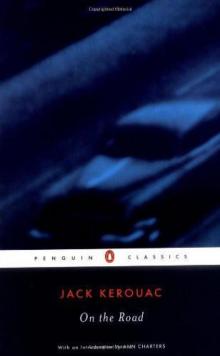 On the Road
On the Road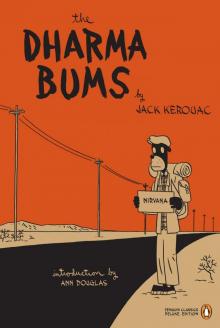 The Dharma Bums
The Dharma Bums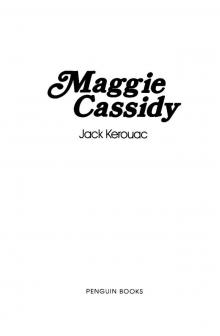 Maggie Cassidy
Maggie Cassidy Big Sur
Big Sur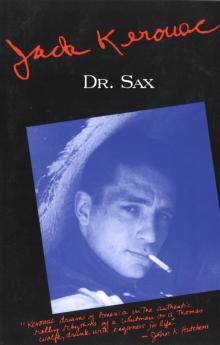 Dr. Sax
Dr. Sax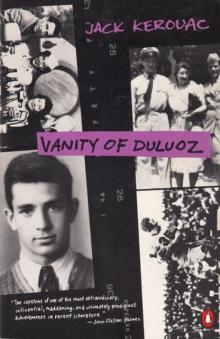 Vanity of Duluoz: An Adventurous Education, 1935-46
Vanity of Duluoz: An Adventurous Education, 1935-46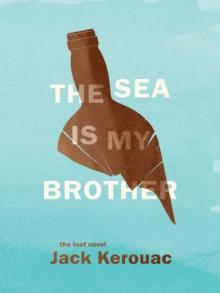 The Sea Is My Brother
The Sea Is My Brother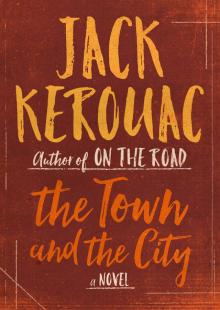 The Town and the City: A Novel
The Town and the City: A Novel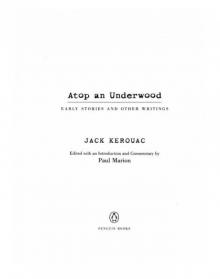 Atop an Underwood: Early Stories and Other Writings
Atop an Underwood: Early Stories and Other Writings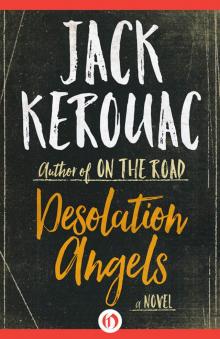 Desolation Angels: A Novel
Desolation Angels: A Novel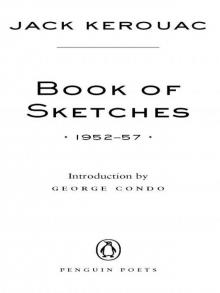 Book of Sketches
Book of Sketches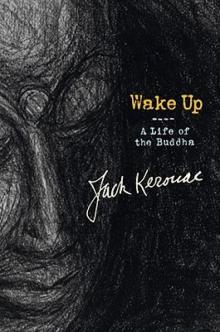 Wake Up: A Life of the Buddha
Wake Up: A Life of the Buddha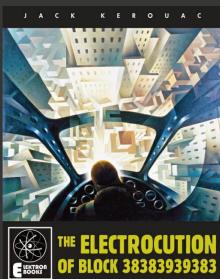 The Electrocution of Block 38383939383
The Electrocution of Block 38383939383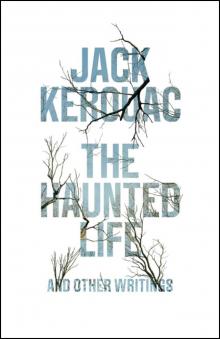 Haunted Life
Haunted Life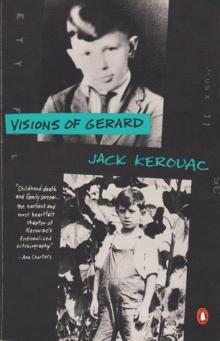 Visions of Gerard
Visions of Gerard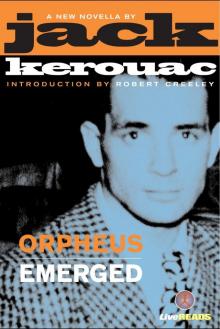 Orpheus Emerged
Orpheus Emerged Book of Blues
Book of Blues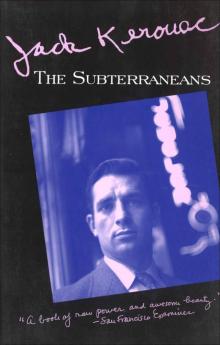 The Subterraneans
The Subterraneans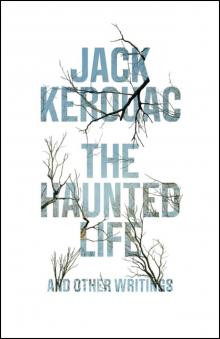 The Haunted Life
The Haunted Life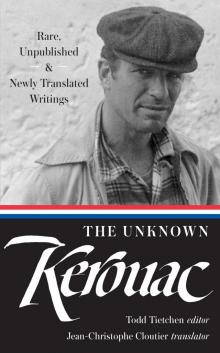 The Unknown Kerouac
The Unknown Kerouac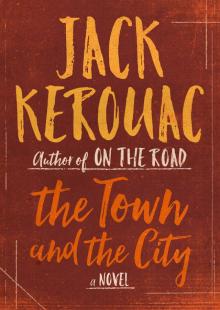 The Town and the City
The Town and the City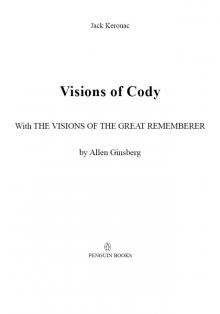 Visions of Cody
Visions of Cody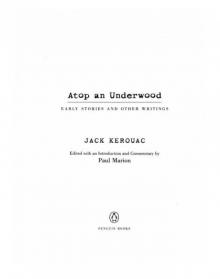 Atop an Underwood
Atop an Underwood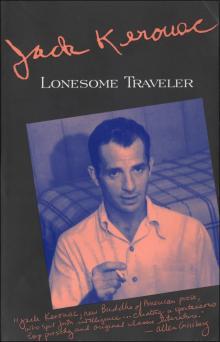 Lonesome Traveler
Lonesome Traveler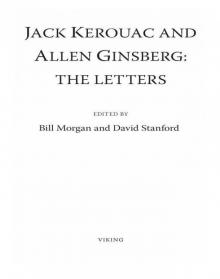 Jack Kerouac and Allen Ginsberg
Jack Kerouac and Allen Ginsberg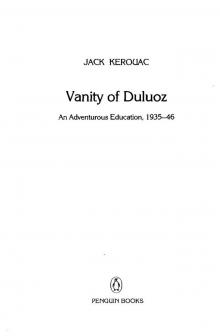 Vanity of Duluoz
Vanity of Duluoz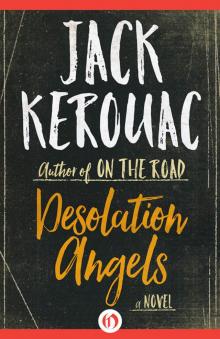 Desolation Angels
Desolation Angels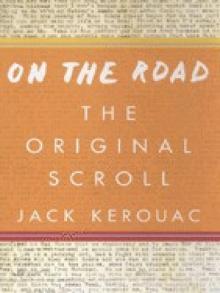 On the Road: The Original Scroll: (Penguin Classics Deluxe Edition)
On the Road: The Original Scroll: (Penguin Classics Deluxe Edition)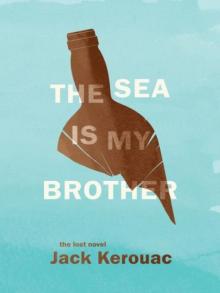 The Sea Is My Brother: The Lost Novel
The Sea Is My Brother: The Lost Novel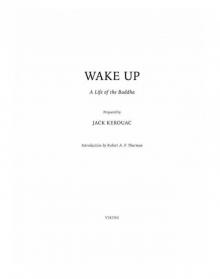 Wake Up
Wake Up The Poetry of Jack Kerouac
The Poetry of Jack Kerouac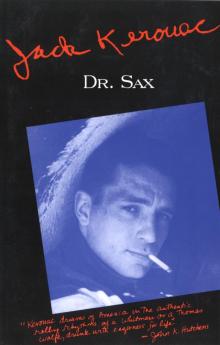 Doctor Sax
Doctor Sax